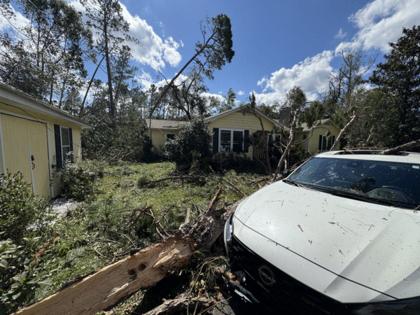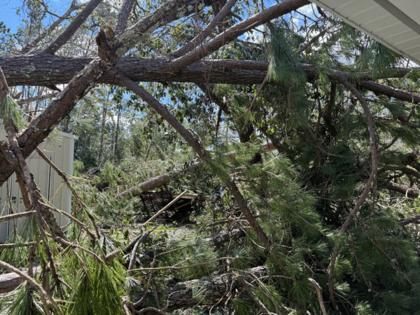After Helene's fury, a Georgia town rebuilds homes, clears roads -- and savors community
Published in Weather News
HAZLEHURST, Ga. – I’m a Southern-to-the-bone, fried chicken and grits-eating, always barefooted small town girl. Simplicity, in an otherwise crazy, untethered world, is my wealth, my richness, my life.
But my hometown became anything but simple after Hurricane Helene came roaring through in late September with vicious Category 2 winds and gusts in excess of 100 miles per hour, cobbled together with innumerable tornadoes. In Helene’s wake, she left hundreds of thousands of oaks and pines toppled, entire pecan orchards flattened as if an atomic bomb had been unleashed on them, and homes and businesses in shambles with many shredded to bits by massively tall pines crashing onto roofs one after another like bowling pins.
Now, a month later, my town’s story needs to be told. This is Helene’s destruction, Georgia-style. Many people read or heard about only North Carolina’s flooding and destruction and then, a week or two later, Milton’s wrath as it crossed Florida. It seems almost as if Helene’s path through Georgia was forgotten, but — believe me — we are as badly wounded as North Carolina and Florida but without the headline-making flooding. This is not only the story of our own Jeff Davis County, but also that of other towns and counties in rural Georgia that took the brunt of Helene: Douglas and Coffee counties, Alma and Bacon counties, Pearson and Atkinson counties, Fitzgerald and Ben Hill counties, and many more as the hellacious Helene churned through here like she was on Sherman’s march to the sea.
On the day before Helene hit, a sense of dread and anxiousness filled my soul. The hurricane was supposed to travel a different route from the Gulf of Mexico northwesterly through western Georgia, Alabama and Tennessee, but made a last-minute turn northeasterly through south and middle Georgia toward North Carolina. As if that weren’t bad enough, Helene conned us badly, with her winds staying calm for most of the afternoon and into the evening, and when we lay down for sleep around 10 o'clock, hardly a breeze stirred the air. The anxiety left me as I fell into slumber; Mother Nature seemed to have taken a pause. Maybe, I tried to believe, everything would be OK.
Around 2 a.m., Helene showed up swinging her fists, as angry as a swarm of hornets. The power went out as she entered, and over the next hours our community – and myriad others around us – became a war zone of utter devastation. The storm raged on seemingly forever as I, along with my husband, Roy, and kitties Simba and Miss Murrie, cowered in the dark, listening to the wind howl, transformers exploding and trees cracking and slamming to the ground with thunderous force. Finally the attack subsided, and as daylight approached, Helene spun away, leaving a wide swath of unbelievable carnage.
At first light, Roy and I stepped on the back porch and looked in astonishment at the ruin. Not a single inch of our back yard was visible; it was smothered by huge pines and oak limbs and shelters flattened. The zinnia garden and woodsy cove next to it – we called it Sleepy Hollow – were just the day before whimsically filled with Bird Lady statues (made famous in John Berendt’s “Midnight in the Garden of Good and Evil”), bird baths and other quirky yard art but overnight turned into a mass of broken concrete and jumbled flora. Pine limbs fell on the car, one piercing the sunroof like a perfectly aimed arrow and another squashing the front end. Rain poured through the sunroof, frying the electrical system. My little Nissan was totaled.
And then we realized we had no escape route if we needed to get to town in a hurry. To the left and right of the driveway, crushed pines lay across the road, trapping us until the county road department arrived later in the day and shoved them to the side. Miraculously, every tree that fell around our yard stopped mere inches – inches! – from slamming into the house, although a lone pine limb sliced like a sharp knife through the back porch ceiling. Massive fallen trees blocked both the front and back porches and most of the windows at the back of the house.
We finally made a path from the front door to the driveway, but it would be more than a week later before Caldwell Tree Service came from Grenada, Mississippi, and cleared the back porch enough to venture into the yard. It took two days for Frank and Michelle Caldwell, with their cranes and heavy equipment, to clear the bloodbath of trees that had once shaded our yard.
We didn’t realize just how trapped we were. Almost every single road in the county was blocked by immense tangles of thousands of fallen trees and wads of tumbled power lines, punctuated here and there by pieces of tin, entire carports, roofs and small buildings that had become flying missiles.
If one of us had been in trouble medically, or a neighbor, or anyone in the county, there’s no way an ambulance could have gotten to us because of trees crisscrossing the roads. Two people died in Jeff Davis County from falling trees.
The entire county was without power, and inexplicably the city’s water system failed, its generators not powerful enough to fight back against the hell that was Helene. Hazlehurst, including its hospital, was left with no electricity or water, and internet and phone service was spotty at best. To this day, a month later, my home still does not have internet and won’t until at least Nov. 7.
We were left shell-shocked, almost paralyzed, and completely overwhelmed by what had just happened to Georgia (and, we would learn later, North Carolina). For more than two weeks, we lived by generator, and for the first four days, since we are on city water, hauled buckets of water from our neighbor for flushing and washing the dishes. The few showers we braved were icy cold, and when the water returned I could wash clothes but used a line and clothespins as a “dryer.” Others were without power for weeks afterward, although the Rural Electric Associations (REA) and Georgia Power staff worked tirelessly, endlessly, selflessly with other power companies from around the U.S. to bring electricity back to our corner of the world.
As a nature lover, to me the loss of trees in our area is earth-shattering. In our yard, only the magnolia – a steel magnolia, apparently – and a couple of heavily damaged oaks still stand. Part of the reason we bought our house nearly 30 years ago was its gorgeous ring of trees that surrounded it on all sides. All of that is gone now, our wonderfully shady yard now full of sunlight and open sky. The red clay dirt road I grew up on, just a quarter-mile from where I live now, was completely blocked by downed trees. My grandparents’ 1870s-era barn where I had played as a child is in tatters. But it is at least still standing, a bruised and battered sentry standing in a testament of strength against Helene.
But the cavalry came to Hazlehurst: my brother Andy and his wife, Darlene, drove two hours from Milledgeville with batteries and supplies, my cousin Martin and his wife, Sharon, came from Richmond Hill near Savannah with food, ice and water, and Roy’s son, Roy III, drove from Brunswick with bottled water and gas for the generator. In town, churches and businesses provided and are still providing food for those who had no power or lost everything. The National Guard came, handling out cases of water and removing debris from yards. Gov. Brian Kemp visited, and after seeing the damage firsthand, promised immediate help.
The heartbreaking fact is that we were as prepared as we could be with plenty of candles, batteries, gas for the generator, food and bottled water. We were ready for a tropical storm — but not a Cat 2 hurricane. In the end, we profoundly realized that no one could be prepared for something they had not gone through before.
The landscape of our city and county changed so much over the course of a few hours. Charles Wasdin, our fire chief and EMA director, stated that an astounding 80% of homes in our county were damaged in some day.
Miss Murrie, the cat that wouldn't let go of me during the hurricane, now refuses to live in the house. She usually loves being inside, but now she'll come through the cat door a few feet and eat, then immediately run back outside and hide. She's completely traumatized. But we are country people, rural people, country cats, and by-gosh we’re going to be fine.
Jeff Davis County was among the worst-damaged counties in Georgia. The ordeal was, still is, exhausting and stressful, but we’re coming back in bits and pieces. Schools are supposed to reopen Monday. Still, renewal and regrowth will no doubt take years and years.
The aftermath of Hurricane Helene has been much like the atmosphere of a barn-raising: hopeful, collaborative, spirited. We pulled together in kinship and kindness, our simple community of neighborhoods, farms, churches and businesses, and we’re rebuilding our beloved small town, this place I call home, as one big family with one big, beautiful heart.
_______
(Mary Ann Anderson is a writer living in Hazlehurst, Georgia.)
_______
©2024 Tribune Content Agency, LLC.












Comments